英语中20种特殊句型
高中英语动词+人、地点+of:特殊句型(精心整理)
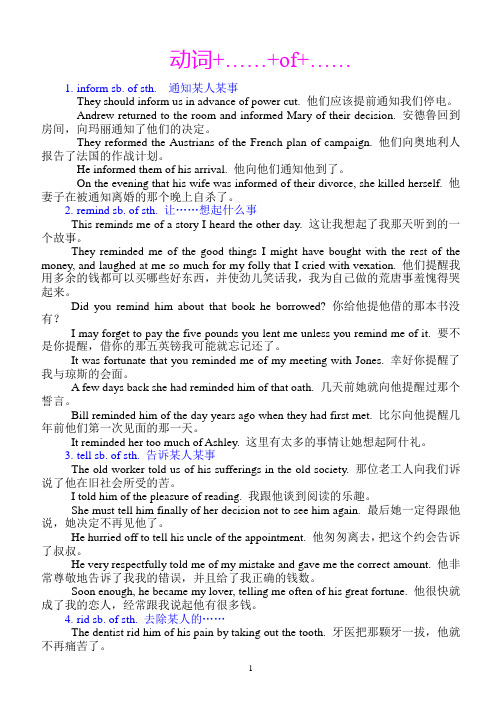
动词+……+of+……rm sb. of sth. 通知某人某事They should inform us in advance of power cut. 他们应该提前通知我们停电。
Andrew returned to the room and informed Mary of their decision. 安德鲁回到房间,向玛丽通知了他们的决定。
They reformed the Austrians of the French plan of campaign. 他们向奥地利人报告了法国的作战计划。
He informed them of his arrival. 他向他们通知他到了。
On the evening that his wife was informed of their divorce, she killed herself. 他妻子在被通知离婚的那个晚上自杀了。
2.remind sb. of sth. 让……想起什么事This reminds me of a story I heard the other day. 这让我想起了我那天听到的一个故事。
They reminded me of the good things I might have bought with the rest of the money, and laughed at me so much for my folly that I cried with vexation. 他们提醒我用多余的钱都可以买哪些好东西,并使劲儿笑话我,我为自己做的荒唐事羞愧得哭起来。
Did you remind him about that book he borrowed? 你给他提他借的那本书没有?I may forget to pay the five pounds you lent me unless you remind me of it. 要不是你提醒,借你的那五英镑我可能就忘记还了。
英语特殊句式题20套(带答案)
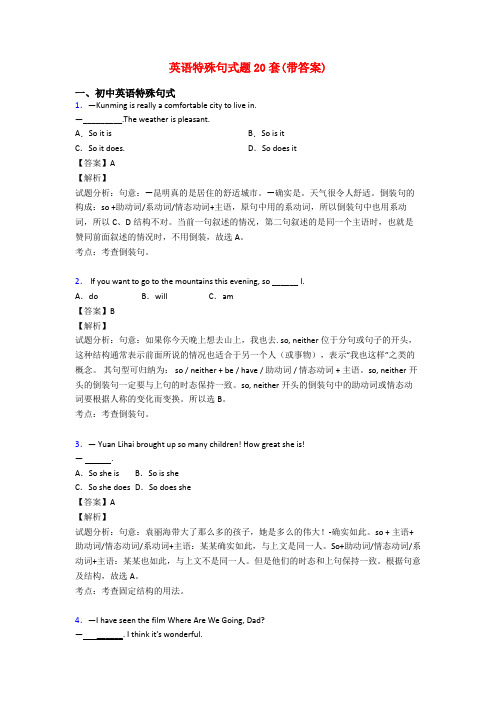
英语特殊句式题20套(带答案)一、初中英语特殊句式1.—Kunming is really a comfortable city to live in.—_________.The weather is pleasant.A.So it is B.So is itC.So it does. D.So does it【答案】A【解析】试题分析:句意:—昆明真的是居住的舒适城市。
—确实是。
天气很令人舒适。
倒装句的构成:so +助动词/系动词/情态动词+主语,原句中用的系动词,所以倒装句中也用系动词,所以C、D结构不对。
当前一句叙述的情况,第二句叙述的是同一个主语时,也就是赞同前面叙述的情况时,不用倒装,故选A。
考点:考查倒装句。
2. If you want to go to the mountains this evening, so ______ I.A.do B.will C.am【答案】B【解析】试题分析:句意:如果你今天晚上想去山上,我也去. so, neither位于分句或句子的开头,这种结构通常表示前面所说的情况也适合于另一个人(或事物),表示“我也这样”之类的概念。
其句型可归纳为: so / neither + be / have / 助动词 / 情态动词 + 主语。
so, neither开头的倒装句一定要与上句的时态保持一致。
so, neither开头的倒装句中的助动词或情态动词要根据人称的变化而变换。
所以选B。
考点:考查倒装句。
3.— Yuan Lihai brought up so many children! How great she is!—.A.So she is B.So is sheC.So she does D.So does she【答案】A【解析】试题分析:句意:袁丽海带大了那么多的孩子,她是多么的伟大!-确实如此。
so + 主语+助动词/情态动词/系动词+主语:某某确实如此,与上文是同一人。
(完整word)20种英语修辞手法整理
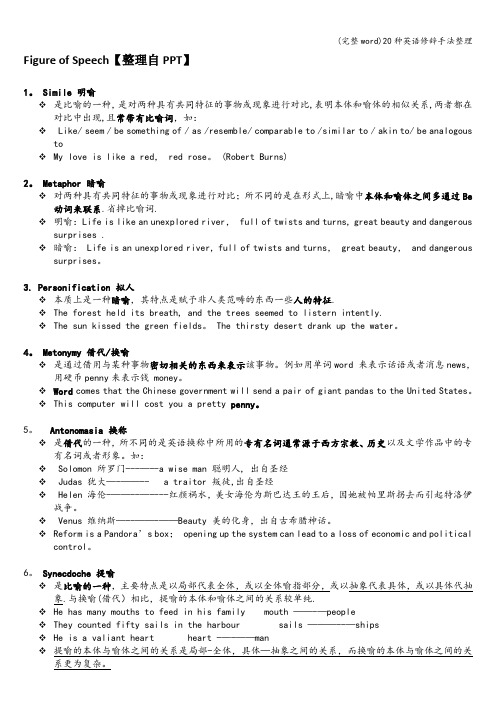
Figure of Speech【整理自PPT】1。
Simile 明喻❖是比喻的一种,是对两种具有共同特征的事物或现象进行对比,表明本体和喻体的相似关系,两者都在对比中出现,且常带有比喻词,如:❖ Like/ seem / be something of / as /resemble/ comparable to /similar to / akin to/ be analogous to❖My love is like a red, red rose。
(Robert Burns)2。
Metaphor 暗喻❖对两种具有共同特征的事物或现象进行对比;所不同的是在形式上,暗喻中本体和喻体之间多通过Be 动词来联系.省掉比喻词.❖明喻:Life is like an unexplored river, full of twists and turns, great beauty and dangerous surprises .❖暗喻: Life is an unexplored river, full of twists and turns, great beauty, and dangerous surprises。
3. Personification 拟人❖本质上是一种暗喻,其特点是赋予非人类范畴的东西一些人的特征.❖The forest held its breath, and the trees seemed to listern intently.❖The sun kissed the green fields。
The thirsty desert drank up the water。
4。
Metonymy 借代/换喻❖是通过借用与某种事物密切相关的东西来表示该事物。
例如用单词word 来表示话语或者消息news,用硬币penny来表示钱 money。
❖Word comes that the Chinese government will send a pair of giant pandas to the United States。
主谓宾宾补例句20句英语

主谓宾宾补例句20句英语(最新版)目录1.引言:介绍主谓宾宾补例句的概念和重要性2.主谓宾宾补例句的构成3.例句分析4.主谓宾宾补例句在英语学习中的应用5.结论:总结主谓宾宾补例句的价值和意义正文一、引言主谓宾宾补例句是英语语法中的一种基本句型,对于学习和掌握英语有着至关重要的作用。
通过分析主谓宾宾补例句,我们可以更好地理解英语句子的结构,从而提高我们的英语水平。
二、主谓宾宾补例句的构成主谓宾宾补例句的基本构成是:“主语 + 谓语 + 宾语 + 宾语补足语”。
其中,主语是句子的主体,谓语表示动作或状态,宾语是谓语动词的对象,宾语补足语则对宾语进行补充或说明。
三、例句分析这里给出 20 个主谓宾宾补例句,以供大家学习和参考:1.I love you.(我爱你。
)2.She watched the movie.(她看了那部电影。
)3.He made her happy.(他让她感到快乐。
)4.They invited us to the party.(他们邀请我们参加派对。
)5.She bought a new car.(她买了一辆新车。
)6.We found the place interesting.(我们发现那个地方很有趣。
)7.They went to the park.(他们去了公园。
)8.She taught me French.(她教我法语。
)9.He doesn"t speak English well.(他英语说得不好。
)10.I don"t know the answer.(我不知道答案。
)11.She doesn"t like coffee.(她不喜欢咖啡。
)12.He didn"t finish his homework.(他没有完成作业。
)13.They arrived at the station on time.(他们准时到达了车站。
高考英语语法It所构成的20个句型详解
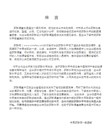
该句型中it 是形式主语,真正的主语是that 引导的主语从句,常译为“清楚(显然,真的,肯定…)” 是主语从句最常见的一种结构。
2. It is not until + 被强调部分 + that …
该句型也是强调句型。主要用于强凋时间状语,译成汉语“直到…才…”,可以说是 not … until … 的强调形式。
It was not until she took off her dark glasses that I realized she was a famous film star.
It is time that children should go to bed. = It is time that children went to bed.
9. It is the first ( second … ) time that …
该句型要和上一个句型区别开来。该句型中的 that 从句不用虚拟语气,而用完成时态。至于用什么完成时态,由主句的谓语动词的时态决定。如果是一般现在时,后面从句用现在完成时态;如果是一般过去时,后面从句则用过去完成时态。该结构中 that 可以省去;it有时用 this 替换。常译为”是第一(二)…次…“。
20种反义疑问句

英语20种特殊的反意疑问句1.祈使句。
祈使句后一般加上will you或won't you构成反意疑问句,用will you 多表示“请求”,用won't you 多表示提醒对方注意。
例如:Look at the blackboard, will you/ won't you?看黑板,好吗?Let引导的祈使句有两种情况:1)Let's...,后的反意疑问句用shall we或shan't we。
例如:Let's go home, shall we/ shan't we? 回家吧,好吗?还可以用may I来表示征求对方的同意或许可。
2)Let us/me...后的反意疑问句用will you或won't you。
例如:Let me have a try, will you/won't you? 让我试一试,行吗?2.感叹句。
感叹句后加反意疑问句时,其反意疑问句需用be的一般现在时态的否定形式。
例如:What fine weather, isn't it? 多好的天气啊,是吧?3. 当陈述部分谓语动词是need, dare, used to,且这些词被用作实义动词时,其反意疑问句需用do的适当形式。
例如:He needs help, doesn't he?他需要帮助,是吗?4.陈述部分主、谓语是I am...时,反意疑问句用aren't I 或ain't I ,而不是am not I (可用am I not)。
例如:I'm working now, ain't I? 我在工作,是吗?5.陈述部分的主语是everything, nothing, anything或something 时,反意疑问句的主语应用代词it。
例如:Something is wrong with my radio, isn't it? 我的收音机出毛病了,是吧?6.陈述部分的主语是 everybody, everyone, anybody, anyone, somebody, someone, nobody, no one, none, neither 时, 其反意疑问句的主语需用复数代词they。
英语47个高级句型

英语47个高级句型1. In light of recent developments...鉴于最近的发展……2. It is worth noting that...值得注意的是……3. Contrary to popular belief...与普遍观点相反……4. With this in mind...考虑到这一点……5. A growing body of evidence suggests that...越来越多的证据表明……6. There is ample evidence to suggest that...有充分的证据表明……7. The current trend indicates that...目前的趋势表明……8. Research has shown that...研究表明……9. It is generally agreed that...一般认为……10. It is widely acknowledged that...广泛认可……11. It is widely believed that...广泛认为……12. It is widely recognized that...广泛承认……13. It is frequently argued that...经常有人争论……14. It is often claimed that...经常有人声称……15. It is commonly thought that...普遍认为……16. It is commonly believed that...普遍相信……17. It is commonly known that...众所周知……18. It is commonly accepted that...普遍接受……19. It is generally assumed that...普遍假设……20. It is generally believed that...普遍相信……21. It is generally regarded as...常被视为……22. It is generally recognized that... 普遍承认……23. It is generally agreed upon that... 普遍一致认为……24. It is widely accepted that...广泛接受……25. It is widely understood that...广泛理解……26. It is widely held that...广泛认为……27. It is widely recognized that...广泛认可……28. It is widely believed that...广泛相信……29. It is widely acknowledged that...广泛承认……30. It is widely known that...众所周知……31. There is a growing body of evidence to support the view that... 越来越多的证据支持这种观点……32. There is increasing evidence to suggest that...越来越多的证据表明……33. There is strong evidence to indicate that...有强有力的证据表明……34. There is compelling evidence to suggest that...有令人信服的证据表明……35. It is becoming increasingly clear that...越来越清楚……36. It is becoming apparent that...变得明显……37. It is becoming evident that...变得明显……38. It is becoming obvious that...变得明显……39. It is becoming more and more evident that...越来越明显……40. It is becoming more and more clear that...越来越清楚……41. It is becoming more and more apparent that...越来越明显……42. It is becoming more and more obvious that...越来越明显……43. Research indicates that...研究表明……44. Research suggests that...研究表明……45. Research has found that...研究发现……46. Studies have shown that...调查研究表明……47. Studies have found that...调查研究发现……这47个高级句型可以帮助你更清楚地表达自己的观点和支持论据。
英语9大时态+3大从句+20个核心句型,必须吃透!

英语9大时态+3大从句+20个核心句型,必须吃透!九种基本时态一、一般现在时概念:表示经常发生的动作或经常存在的状态。
常和always,often,usually,sometimes,every day等表时间的状语连用。
如:1)I go to school every day.我每天都去学校。
(表经常)2)He is always like that.他总是那样。
(表状态)构成:1)主语+be(am/are/is).+..……2)主语+实义动词+…二、一般过去时概念:1)表示过去某个时间发生的动作或存在的状态。
常和表示过去的时间状语连用。
如:yesterday,last week,in 1998,two days ago等。
如:I went to a movie yesterday.我昨天去看了一场电影。
2)也可表示过去经常或反复发生的动作。
如:He always went to work by bike last week.构成:1)主语+be(was/were)+.……2)主语+实义动词过去式+…三、现在进行时概念:表示现在(说话瞬间)正在进行或发生的动作。
如:He is singing.They are watching TV now.构成:主语+助动词be(am/are/is)+动词-ing形式构成.四、过去进行时概念:表示过去某一时刻或某一段时间正在进行的动作。
这一特定的过去时间除了有上下文暗示外,一般用时间状语来表示。
如:1)--What were you doing?-I was jumping.2)--What was the boy doing when the UFO arrived?--He was sleeping.构成:主语+助动词be(was/were)+动词-ing形式构成。
五、一般将来时概念:表示将来某个时间要发生的动作或存在的状态,也表示将来经常或反复发生的动作,常与表示将来的时间状语连用。
英语特殊句式题20套(带答案)及解析
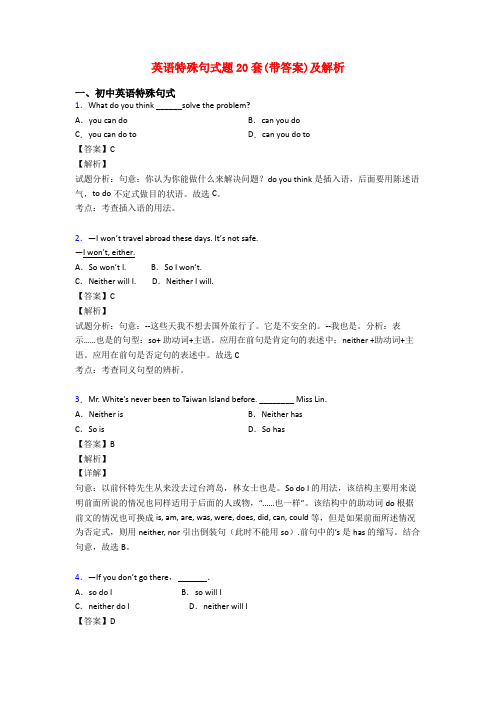
英语特殊句式题20套(带答案)及解析一、初中英语特殊句式1.What do you think ______solve the problem?A.you can do B.can you doC.you can do to D.can you do to【答案】C【解析】试题分析:句意:你认为你能做什么来解决问题?do you think是插入语,后面要用陈述语气,to do不定式做目的状语。
故选C。
考点:考查插入语的用法。
2.—I won’t travel abroad these days. It’s not safe.—I won’t, either.A.So won’t I. B.So I won’t.C.Neither will I. D.Neither I will.【答案】C【解析】试题分析:句意:--这些天我不想去国外旅行了。
它是不安全的。
--我也是。
分析:表示……也是的句型:so+ 助动词+主语。
应用在前句是肯定句的表述中;neither +助动词+主语。
应用在前句是否定句的表述中。
故选 C考点:考查同义句型的辨析。
3.Mr. White’s never been to Taiwan Island before. ________ Miss Lin.A.Neither is B.Neither hasC.So is D.So has【答案】B【解析】【详解】句意:以前怀特先生从来没去过台湾岛,林女士也是。
So do I的用法,该结构主要用来说明前面所说的情况也同样适用于后面的人或物,“……也一样”。
该结构中的助动词do 根据前文的情况也可换成is, am, are, was, were, does, did, can, could 等,但是如果前面所述情况为否定式,则用neither, nor引出倒装句(此时不能用so).前句中的’s是has的缩写。
结合句意,故选B。
4.—If you don’t go there,.A.so do I B.so will IC.neither do I D.neither will I【答案】D试题分析:句意:如果你不去那,我也不去。
It句型用法详解

It句型用法详解研究1991-2005年的高考试卷中可以发现含it的句型年年考到。
可见it句型的重要性和使用的普遍性。
现根据其用法特点归纳为20个句型.1. It +be + 被强调部分 + that ...该句型是强调句型。
将被强调的部分放在前面,其它部分置于that之后。
被强调部分可以是主语,宾语,表语或状语。
强调的主语如果是人,that可以由who换用。
如果把这种句型结构划掉后,应该是一个完整无缺的句子。
这也是判断强调句型与其它从句的方法。
It was about 600 years ago that the first clock with a face and an hour hand was made.It was they that (who ) cleaned the classroom yesterday.It was in the street that I met her father.It was neither you nor he that is willing to go to the Great Wall.It was he as well as his classmates who has ever been to Suzhou.(强调含有either...or...,neither...nor...,not only...but also...,as wellas,not...but...等词组所构成的句子)强调句型还可以怎样设计?这种提法并不是要把我们弄糊涂,而是要培养我们对该句型的应变能力。
万变不离其宗,要对强调句型产生免疫力,就要对该句型各种可能的考法烂熟于心。
下面我们谈谈强调句的考法设计。
1.1.疑问法:疑问法可分为一般疑问法和特殊疑问法两种。
主要是通过改变语序后将it和that混在一块儿,使考生对结构无法辨认而出错。
这形式可考查考生的纠错能力。
一般疑问句:①. Is _______ student_______ was caught smoking in the classroom?A. it that, thatB. that it, itC. it it, thatD. it which, that特殊疑问句:②. _______ he got up?A. When was that itB. Was it when thatC. When was it thatD. Was that when it③. Where________ he picked the wallet?④. _______ student________ you referred to?结论:一要注意语序;二要注意词序(特殊疑问词要置于句首),三要注意特殊疑问词的选用,疑问代词还是疑问副词。
英语常用50种高级句子

英语常用50种高级句子英语常用50种高级句子大全1) 主语+ cannot emphasize the importance of …too much.(再怎么强调……的重要性也不为过。
)例如:We cannot emphasize the importance of protecting our eyes too much.2)There is no need for sb to do sth. for sth.(某人没有必要做……),例如:There is no need for you to bring more food. 不需你拿来更多的食物了。
3)By +doing…,主语can …. (借着……,……能够……),例如:By taking exercise, we can always stay healthy. 借着做运动,我们能够始终保持健康。
4) …enable + sb.+ to + do…. (……使……能够……),例如:Listening to music enables us to feel relaxed. 听音乐使我们能够感觉轻松。
5) On no account can we + do…. (我们绝对不能……),例如:On no account can we ignore the value of knowledge.我们绝对不能忽略知识的价值。
6) What will happen to sb.? (某人将会怎样?), 例如:What will happen to the orphan? 那个孤儿将会怎样?7)For the past + 时间,主语+ 现在完成式…. (过去……年来,……一直……)例如:For the past two years,I have been busy preparing for the examination. 过去两年来,我一直忙着准备考试。
初中英语中考复习 考点20 祈使句和倒装句-备战2021年中考英语考点一遍过 (解析版)

考点20 祈使句和倒装句命题趋势:在近五年中考题中,对祈使句的考查在单项选择等题型中有所体现,侧重考查考生的综合运用能力。
中考考查重点:1. 否定的祈使句;2. 以let开头的祈使句;3. 祈使句与简单句、复合句之间的转换;4. 祈使句的应答语。
考向一:祈使句的基本用法祈使句是用来表示命令、请求、建议或劝告等的句子。
常省略主语,谓语动词用原形。
1. 肯定的祈使句①句型:动词原形+其他成分。
Be careful! 小心!②"Do+祈使句"表示一种强烈的感情或请求,do起强调作用。
③please用在祈使句中可以表示一种客气的语气,但please用在句末时,必须用逗号与其余部分隔开。
Close the door, please. 请关门。
2. 否定的祈使句①常用句型:Don’t+动词原形+其他成分。
Don’t be late for school again! 别再迟到了!②用Never开头:Never+动词原形+其他成分。
Never leave today’s work for tomorrow! 不要把今天的工作留到明天!3. Let引导的祈使句以Let开头的句子也是祈使句,表示陈述和建议。
其否定形式有两种:Let...not或Don’t...Let us not be late. 让我们不要迟到。
Don’t let the boy play football in the street. 不要让这个男孩在街上踢足球。
【2020 •凉山州】When I want to go out to play with my friends, my mother always says, “____________ at home. Don’t waste your time.”A. StayB. StaysC. To stayD. Staying【答案】A【解析】句意:当我想和朋友一起出去玩时,妈妈总是说:“待在家里。
英语四六级常考的20个英语句型

英语四六级常考的20个英语句型1. as…as 和……一样中间必须用形容词或副词原级。
例如:This classroom is as big as that one.这间教室和那间一样大。
He runs as fast as Tom. 他和汤姆跑的一样快。
否定结构:not as/so…as,“不如……”。
上面的两个句子可分别改为:This classroom is not as/so large as that one.这间教室不如那间大。
He doesn’t run as/so fast as Tom.他跑得不如汤姆快。
2. as soon as 一……就……用来引导时间状语从句。
若主句是一般将来时,从句要用一般现在时。
例如:I’ll tell him the plan as soon as I see him.我一看到他就告诉他这个计划。
He’ll go home as soon as he finishes his work.他一完成工作就回家。
3. be busy/enjoy/hate/go on/finish doing sth. 忙于/喜欢/讨厌/继续/完成做某事在enjoy, finish, hate, go on, be busy等词语后,一般用动词-ing 形式作宾语。
例如:Lin Tao is busy making a model plane.林涛正忙着做飞机模型。
My mother enjoys taking a walk after supper.我妈妈喜欢晚饭后散步。
I hate watching Channel Five.我讨厌看五频道。
When someone asked him to have a rest, he just went on working. 当有人让他休息一会儿时,他仍继续工作。
I have finished writing the story.我已经写完了故事。
英语五大句型例句每种20个例句
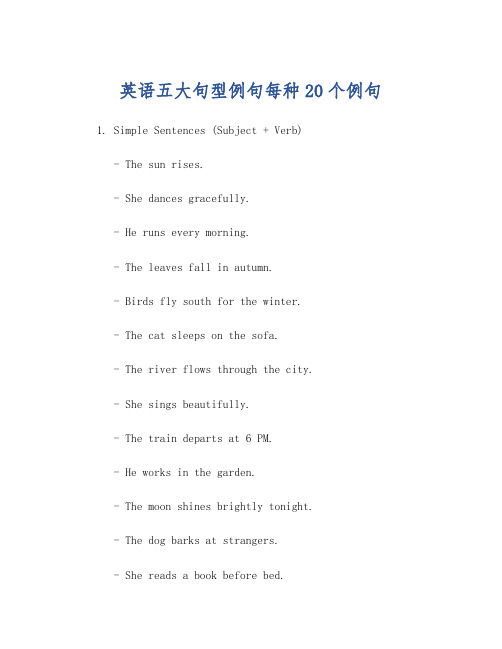
英语五大句型例句每种20个例句 1. Simple Sentences (Subject + Verb)- The sun rises.- She dances gracefully.- He runs every morning.- The leaves fall in autumn.- Birds fly south for the winter.- The cat sleeps on the sofa.- The river flows through the city.- She sings beautifully.- The train departs at 6 PM.- He works in the garden.- The moon shines brightly tonight.- The dog barks at strangers.- She reads a book before bed.- The wind blows gently.- He swims in the ocean.- The flowers bloom in spring.- She cooks dinner for the family.- The car accelerates quickly.- He walks to the store.- The rain falls softly.- The clock ticks loudly.2. Compound Sentences (Subject + Verb + Object) - I read a book about history.- She enjoys eating chocolate.- He plays the piano every evening.- They watch movies on weekends.- The children love playing in the park.- She hates getting up early.- He studies hard for his exams.- The birds eat seeds from my hand.- She listens to music while working.- The teacher assigns homework daily.- He buys groceries on his way home.- The students write essays for class.- She chooses a red dress for the party.- He catches the ball with ease.- The dog fetches the stick.- She opens the door for me.- The wind carries the scent of flowers.- He finds joy in helping others.- The waves crash against the shore.- She paints a picture of the sunset.- The children receive gifts for Christmas.3. Complex Sentences (Subject + Verb + Object +Subordinate Clause)- I will call you when I arrive.- She will be happy if you visit her.- He is reading a book that I recommended.- The cat sleeps where it's warm.- The students will pass the test if they study. - She sings loudly because she is excited.- He is a great athlete despite his age.- The flowers bloom when the weather is warm.- She cooks dinner while the children play.- The train is late because of the storm.- He will succeed if he works hard.- The moon is bright even though it's cloudy.- The dog barks whenever it hears a noise.- She smiles because she is happy.- The wind blows harder as the storm approaches.- He swims faster than anyone else in the team.- The flowers wilt after the rain.- She cries because she is sad.- The car stops when the light turns red.- He feels proud because he finished the race.4. Compound-Complex Sentences- I will call you after I finish my work, and then we can go out for dinner.- She enjoys painting and often spends her weekends in the studio.- He plays the guitar, and his brother plays the drums.- The children play outside, but they come in whenit's dark.- She hates getting up early, so she sets her alarmfor the latest possible time.- He studies hard for his exams, and as a result, he always gets good grades.- The birds eat seeds from my hand, which is why theycome to my garden.- She listens to music while working, and it helps her concentrate.- The teacher assigns homework daily, but the students still enjoy their classes.- He buys groceries on his way home, and he always picks up something special for me.- The students write essays for class, and they learn a lot from the process.5. Sentences with Non-Finite Verbs (Gerunds and Infinitives)- Reading is a great way to relax.- She loves playing the violin.- He stopped to admire the view.- The children enjoy playing games.- I prefer watching movies to reading books.- She hates being woken up early.- He dreams of traveling the world.- The cat dislikes being disturbed while sleeping.- She stopped to listen to the music.- The students are excited about learning new things. - He is good at solving complex problems.- The flowers need watering regularly.- She is considering changing her career.- He is capable of achieving great things.- The dog is trained to fetch the ball.- She is fond of collecting stamps.- The wind is strong enough to move the leaves.- He is interested in learning a new language.- The children are eager to start their summer vacation.。
【英语】英语特殊句式题20套(带答案)及解析

【英语】英语特殊句式题20套(带答案)及解析一、初中英语特殊句式1.—What language is that guy speaking? I can’t catch a word.—. He’s from India, so I guess it is Hindi.A.so can I B.so I canC.neither can I D.neither I can【答案】C【解析】【详解】句意:——那个人讲的什么语言?我一个词都听不懂。
——我也不能,他来自印度。
因此我猜是印地语。
考查倒装语序。
so can I我也能。
用于肯定句后,指我也……; so I can我确实能,用于肯定句后,强调“我确实能……”;neither can I我也不能,用于否定句后,指“我也不能……”;neither I can结果不存在。
根据句意可知前句是否定句,后句指“我也不能……”。
故选C。
2.—It’s very hot, but quite wet today.—_____A.So it is. B.It is so.C.So is it. D.So it does.【答案】A【解析】试题分析:句意:-今天天气很热,但是很湿润。
-的确是这样。
So it is.的确如此;So is it.它也是这样。
根据句意可知,这里是说话人在肯定前面一个人的话,应该不用倒装的结构,并且句中有be 动词的形式,故应该选A。
考点:考查情景交际。
3. She is a good student, and works very hard, _________.A.So it is with him B.So does himC.so it he D.neither does he【答案】A【解析】试题分析:句意:她是个好学生,并且努力学习。
So it is with him他的情况也一样.,根据句意,故选A。
考点:考查情景交际。
40个高级句型,高考英语写作20+必备!

1. 主语+ cannot emphasize the importance of … too much. (再怎么强调……的重要性也不为过。
)例:We cannot emphasize the importance of protecting our eyes too much.我们再怎么强调保护眼睛的重要性都不为过。
2. There is no need for sb to do sth. / for sth. (某人没有必要做……)例:There is no need for you to bring more food. 你不需要拿来更多的食物了。
3. By + doing…,主语+ can …. (借着……,……能够……)例:By taking exercise, we can always stay healthy. 通过做运动,我们能够始终保持健康。
4. … enable sb. to do…. (……使……能够……)例如:Listening to music enables us to feel relaxed. 听音乐使我们能够感觉轻松。
5. On no account can we do… (我们绝对不能……)例:On no account can we ignore the value of knowledge.我们绝对不能忽略知识的价值。
6. What will happen to sb.? (某人将会怎样?)例如:What will happen to the girl? 那个女孩儿将会怎样?7. For the past +时间,主语+ 现在完成式/ 现在完成进行时…… (过去..时间以来,……一直……)例如:For the past two years, I have been busy preparing for the examination.过去两年来,我一直忙着准备考试。
20个最地道的英语句型

1. Hello Friend!Hey, man, good to see you. 嗨,幸会。
Good to see you too, I think. 幸会……,⼤概。
Good afternoon, sir. 下午好,先⽣。
At ease. 休息。
Good evening, how are you?晚安,你好吗?Hello, Randy. Is he going to be taken care of?喂,蓝迪,你肯把那家伙收拾掉吗?Sure thing, boss. All in a day's work. 当然,头,这是家常便饭。
Hi, Joe!嗨,乔!Hello, Tom, what's happening?你好,汤姆,怎么啦?Morning, Alice. 早上好,爱丽斯!Bye! Have a good day. 再见!请慢⾛!Bye!再见啦!Good morning, dear. 早,亲爱的。
2. This Happy Feeling (1)Internet is number one!国际互联真是顶呱呱!We finally made it. 我们终于做到了!Well done! Bond, you've done it!好极了!邦德,⼲得好!Yay, a hole in one!嘿!⼀杆进洞!(⼀击必杀?)Oh well, better luck next time. 算了,下次的运⽓会更好。
Steady wins the race. 从容就是赢得⽐赛的诀窍。
Chase the nice bone, doggie. 狗兄,去追那可⼝的⾻头啊。
(俚语,不⽤解释了吧?)Tell me, is it a boy?喂,你是男孩吗?Come on, honey. 过来,亲爱的。
He swept her off her feet. (俗语)他对她可着迷了。
Beautiful!漂亮!(和美丽可没关系呦。
- 1、下载文档前请自行甄别文档内容的完整性,平台不提供额外的编辑、内容补充、找答案等附加服务。
- 2、"仅部分预览"的文档,不可在线预览部分如存在完整性等问题,可反馈申请退款(可完整预览的文档不适用该条件!)。
- 3、如文档侵犯您的权益,请联系客服反馈,我们会尽快为您处理(人工客服工作时间:9:00-18:30)。
英语中20种特殊句型
1. it作先行主语和先行宾语的一些句型
It is an important thing to learn English well.
学好英语是件非常重要的事情。
I made it clear that I have no intention of going with you.
我已经说清楚了,我不想和你走。
2. 强调句型
It was I who met Li Ming at the railway station yesterday.
是我昨天在火车站遇见了李明。
3.“All+抽象名词”或“抽象名词+itself”(=very+形容词)
He was all gentleness to her.
他对她非常温存。
4.“not(never) too…+不定式”结构:“not too…to do”的意思是“并不太……所以能做……”。
One is never too old to learn.
活到老,学到老。
5. 同格名词修饰是指of前后的两个名词都指同一个人或物,“of”以及它前面的名词构一个形容词短语,以修饰“of”后面的那个名词。
如“her old sharper of a father”,可译为:“她那骗子般的父亲”。
Those wolves of boys eat so much.
那些狼一般的男孩子吃那么多。
6.“as good as…”可译为“相等于,就像,几乎如;实际上,其实”。
The merchant as good as promised the orphan boy, that he would adopt him.
那商人等于许诺要把那孤儿收为养子。
7. to make…of可译为“使……成为……,把……当作”。
I will make a scientist of my son.
我要把儿子培养成为一名科学家。
8.no more…than…句型
A home without love is no more a home than a body without a soul is a man.
正像没有灵魂的躯体不称其为人一样,没有爱情的家庭也不称其为家庭。
9.“not so much…as…”和“not so much as…”结构:
not so much…as…=rather than,其中as有时可换成but rather,可译为:“与其说是……毋宁说是……”。
而“not so much as”=“without (not) even”,可译为“甚至……还没有”。
The oceans do not so much divide the world as unite it.
与其说海洋把陆地分开,不如说海洋把陆地连在一起。
10.“Nothing is more…than”和“Nothing is so…as”结构:
“Nothing is more…than”和“Nothing is so…as”都具有最高级比较的意思,“nothing”可换用“no”,“nobody”,“nowhere”,“little”,“few”,“hardly”,“scarcely”等等,可译为“没有……比……更为”,“像……再没有了”,“最……”等。
Nothing is more precious than time.
没有什么比光阴更可贵的东西了。
11.“cannot…too…”结构:“cannot…too…”意为“It is impossible to overdo…”,即“无论怎样……也不算过分”。
“not”可换用“hardly”,“scarcely”等,“too”可换用“enough”,“sufficient”等。
You cannot be too careful.
你越细心越好。
That which is good cannot be done too soon.
好事做得越快越好。
12.“否定+but”结构:否定词后面的“but”具有“which not”,“who
not”,“that not”,等等否定意义,构成前后的双重否定。
可译成“没有……不是”或“……都……”等。
Nothing is so bad but it might have been worse.
事情虽糟,但还不是最糟的。
13.“not so…but”和“not such a…but”结构:这两个结构和“否定+but”的结构差不多,不同之处是这两个结构中的“but”是含有“that…not”意味的连接词,表示程度。
可译为“还没有……到不能做……的程度”,“并不是……不……”,“无论怎样……也不是不能……”等。
He is not so sick but he can come to school.
他没有病到不能上学的程度。
14.“疑问词+should…but”结构:这个结构表示过去的意外的事,意为“none…but”,可译为“除了……还有谁会……”,“岂料”,“想不到……竟是……”等。
Who should write it but himself?
除了他本人以外,还会有谁写呢?
15.“who knows but (that)…”和“who could/should…but”结构:这个结构是反问形式,一般意译为“多半”,“亦未可知”等等,有时也可直译。
Who knows but (that) he may go?
他多半会去的。
(他会去也未可知。
)
16.“祈使句+and”和“祈使句+or”结构:“祈使句+and”表示“If…you…”,“祈使名+or”表示“If not…, you…”。
Add love to a house and you have a home. Add righteousness to a city and you have a community. Add truth to a pile of red bricks and you have a school.
一所房子加上爱心,你就有了一个家;一个城市加上正直守法,你就有了一个社区;在红砖房子里加上真理,你就有了一所学校。
Don’t go too close to him, or you’ll be found fault with.
不要太接近他,不然他就会找你的岔子。
17.“名词+and”结构,在这个结构中,名词等于状语从句,或表示条件,或表示时间。
A word, and he would lose his temper.
你再说一句他就要生气了。
18.“as…, so…”结构:这里“so”的意思是“in the same way”(也是如此)。
此结构表明两个概念在程度上和关系上相似。
As rust eats iron, so care eats the heart.
忧能伤人,犹如锈能蚀铁。
19.“if any”结构:“if any”和“if ever”,意思是“果真有……”,“即使有……”,表示加强语气。
与此类似的还有:“if anything”(如有不同的话,如果稍有区别),“if a day”(=at least,至少)。
There is little, if any, hope.
即使有希望,也是希望甚微。
20.“be it ever (never) so”和“let it be ever (never) so”结构:这里,“be it”中的“be”是古英语假设语气的遗留形式,现代英语则使用“let it be”。
“ever so”和“never so”都表示同一意思,都表示“very”。
Be it ever so humble (Let it be ever so humble), home is home.
无论怎样简陋,总是自己的家。
